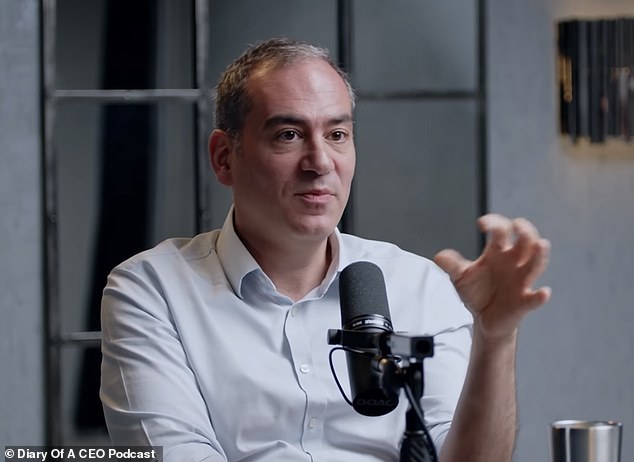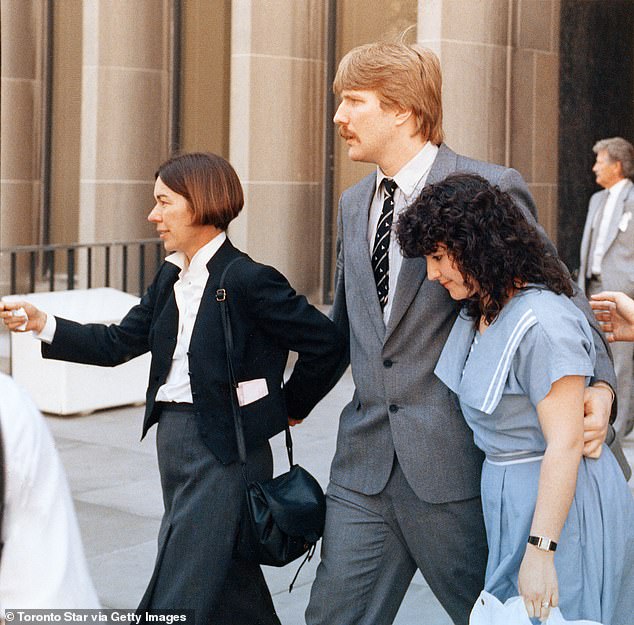The terrifying consequences of sleepwalking: Sleep scientist recalls terrifying 1988 case of a man who drove his car and murdered his mother-in-law without waking
A sleep scientist told of a bizarre case of a sleepwalker, where a man drove miles to his mother-in-law’s house to kill her, but was acquitted.
Professor Guy Leschziner, a world-renowned expert in neurology and sleep medicine, was a guest on Dragons’ Den star Steven Bartlett’s The Diary of a CEO podcast to talk about sleep disorders and how sleepwalking can be used as a defence in court.
The most infamous case occurred in Canada in 1988, when 23-year-old Kenneth Parks of Toronto was acquitted of the murder and attempted murder of his parents-in-law.
In the early morning of May 23, 1987, he drove 14 miles to their home, broke in, attacked his father-in-law Denis and stabbed his mother-in-law Barbara Woods, 42, to death.
Parks, who had gambling debts, claimed he was asleep the entire time and didn’t know what he was doing.
The most infamous sleepwalking case occurred in Canada in 1988, when 23-year-old Toronto man Kenneth Parks (center) was acquitted of the murder and attempted murder of his in-laws.

Professor Guy Leschziner (pictured) speaks on the podcast The Diary of a CEO, in which he discusses bizarre cases of sleepwalking, including cases of people committing murders while they slept.
Leschziner said: ‘Apparently in in his sleep he drove several kilometers to his in-laws’ house and apparently I got a a tire iron from the trunk of his car and beat his mother-in-law to death.
‘He then tried to kill his father-in-law and eventually threw him into a swimming pool. Things got even weirder when it turned out that he had financial problems and that he had been talking to his parents-in-law about financial matters. However, a court ruled that this happened while he was sleepwalking.
‘He was actually acquitted, so this is a remarkable story, is it impossible for someone to drive in their sleep? No, I’ve seen it myself, but it seems a bit of an exaggeration that someone could do all that while they were asleep, but in court he was found not guilty.’
Defense attorney Marlys Edwardh said that on the night of the murder, Parks “fell into a deep, deep sleep. His next memory is seeing his mother-in-law’s face.”
The lawyer said he then regained consciousness, fled the house and drove to a nearby police station.
Toronto Police Homicide Squad member Bob Adair testified that Parks said he had no idea how he got to his in-laws’ house and told officers he had no reason to harm them.
Leschziner said that while it is unusual to drive while asleep, it does happen. He has a patient who has experienced this multiple times.

In the early morning of May 23, 1987, he drove 14 miles to their home, broke in, attacked his father-in-law Denis and stabbed his mother-in-law Barbara Woods, 42, to death

Leschziner is a world-renowned expert in neurology and sleep medicine and was the latest guest on Dragons’ Den star Steven Bartlett’s (pictured) podcast The Diary of a CEO.
He said, ‘I have a patient, who I don’t see anymore, who I mentioned in my book, who has driven several miles in her sleep, and in her youth she even rode a motorcycle in her sleep, and all she knew was that her landlady at the time said, “Where were you going at 1:00 in the morning with your motorcycle helmet in your hand?”
‘She had clearly been out in the middle of the night without remembering it.’
The professor said that in these types of situations it is likely that most of the brain is “probably awake” because it is difficult to imagine how someone could perform complex tasks if the majority of their brains were asleep.
Leschziner admitted that he has seen many people commit crimes in their sleep and that some of them have been convicted.
He said, ‘I was involved someone who shot a family member their sleep. I’ve seen people who have been sexually abused in their sleep. Someone who has been convicted of rape because of a sleep disorder.’
The professor said the following about the way sleep disorders are investigated in court after a serious crime has been committed: ‘First, does the past behavior match what happened that night.
‘Secondly, are there any features of the event itself that indicate that there was an attempt to cover it up, or that there was some planning to commit that particular act?
‘Also whether by studying the person’s sleep, evidence can be found that he/she suffers from this type of sleep disorder.’
